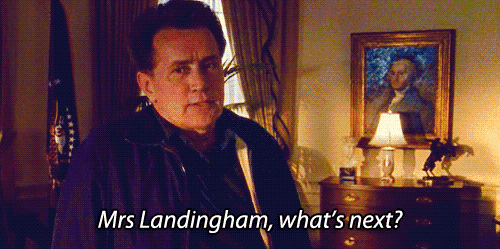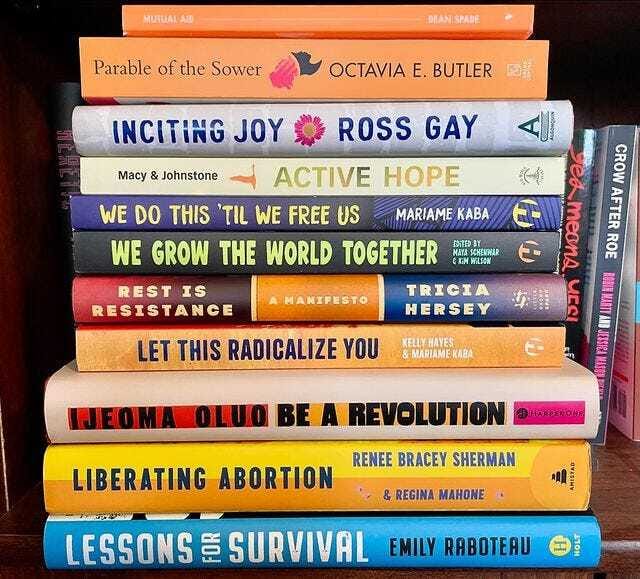- Creativity for Good
- Posts
- unexpected optimism
unexpected optimism
once more with feeling (another post-election newsletter)
I went to bed at 7:45pm the night of the election this year.
My justification, not that anyone needs to justify an early bedtime on what was inevitably going to be a Stressful As Fuck kind of night, was that my kids spent the day wiping me out emotionally, I was fighting off a migraine, and — possibly most importantly — I had already done everything I could. There were, at that point, no more actions I could take to change the course of the election. Given the option between staying up all night biting my nails and panicking, or taking a painkiller and crashing, I went with the path of least emotional exhaustion.
I don’t know whether my reaction to the results would have been different if I had stayed up all night watching the votes come in and the electoral map change colors. But what I do know is that unlike in 2016, when I woke up to a feeling of crushing despair and overwhelming terror, I woke up on November 6 of this year, checked the news, and my first thought was: “Okay. So what’s next?”

It’s been just under three weeks since the election, and in that time, many people, with much larger platforms and much wiser words, have sent out their messages of optimism and organization, empowerment and empathy. I debated whether or not to send anything at all (because let’s be real, do we really need more post-election newsletters at this point?) but ended up deciding to do so because, at the end of the day, I don’t think I can write a newsletter called “Creativity for Good” and not send something at a time when we need both creativity and goodness — and the combination of the two.
One of the quotes that has been making the rounds very frequently these days — for both good and obvious reasons — comes from the late, great Toni Morrison, writing for the 150th anniversary issue of The Nation, where she served as a member of the editorial advisory board:
This is precisely the time when artists go to work. There is no time for despair, no place for self-pity, no need for silence, no room for fear. We speak, we write, we do language. That is how civilizations heal.
Morrison’s words have a particular resonance for creatives who find themselves driven toward action in moments like this because, I think, they pair so beautifully with another call to arms echoing throughout organizing spaces right now: “Let this radicalize you, rather than lead you to despair.” This message, from which the recent book by Mariame Kaba and Kelly Hayes gets its title (and by the way, Haymarket Books is currently offering the ebook of Let This Radicalize You free of charge — if you don’t have a copy, now’s the time to get one), is a different but no less critical approach to what Morrison’s message encourages.
Namely: Despair is easy. It is tempting, and simple, and perhaps most dangerously, safe. There’s a reason that “doomscrolling,” while horrible for us in every possible way, is nonetheless deeply addicting. It is justifiable inaction, a refuting of responsibility in the guise of “becoming informed” or “staying on top of what’s going on.”
But information, without action, is useless. It doesn’t matter how informed you are about the atrocities of the world if all you are doing is knowing about them. There is bearing witness, yes, but what good does bearing witness do, without an attempt to stop what is happening? If you will watch a video of a child dying, but not call your representative to demand they stop sending bombs, or send your dollars to the organizations trying to save that child’s life, or donate your art or your words or your time to the work of change, are you doing anything other than harming yourself?
(No, you’re not.)
Writing for Literary Hub in the days following the 2016 election, Heather Wells Peterson said, “Art in the face of tragedy is not frivolous. Our factories don’t stop building cars and trucks, they don’t stop packaging food or filling tubes of toothpaste. If the wheels of capitalism continue to turn and produce, why can’t the wheels of art?” If there’s a temptation in these moments to dwell in despair, I think there’s an equal, and no less overwhelming, temptation to turn ourselves fully toward action. My immediate “what’s next?” was a symptom of this same impulse. But at the same time, the belief that art and action are two separate things is simply untrue.
Art is a form of action. Creation — not productivity, which is the tool of capitalism, but creation — is the antidote to despair. When we show up to create something, whether it’s a poem or a painting or a song or a meal or a how-to guide or a list of introductory texts for rookie organizers or even a video for a loved one to brighten their day, we are, in a thousand tiny but no less meaningful ways, showing up for ourselves, our communities, and our values, as well. If, as Amber Massie-Blomfield wrote shortly after Trump’s win earlier this month, protest is a form of creative expression, then the opposite must be true as well: Creative expression is a form of protest.
So, let this moment radicalize you. Let us go to work.
questions on creating for good
What are you feeling right now?
Is your heart turning outward towards action, or curling in towards despair? How are you balancing the needs of your community with caring for your soul, your body, your precious, fragile heart?
Where do you feel called to go in this moment?
And just as critically, where is your creativity taking you? What new forms of creation are you exploring? What themes are appearing in your work? Are there new types of expression that are resonating with you? Have your relationships with the creative actions you’re used to taking changed? How does that feel?
How are you showing up?
What actions have you felt called to take to make tangible changes towards a more liberated future? Where do you feel the most discomfort, or the least? Who are you in community with? What are the relationships between your creative communities and your communities of action? Who can you ask for help, and where can you offer your own aid?
resources, links, and further reading
spotlight on: creativity as protest, and the fight ahead
read:
Strengthening our spirits to resist and thrive in these times (Finding Steady Ground)
10 ways to be prepared and grounded now that Trump has won (Daniel Hunter for Waging Nonviolence)
But Can It Change Anything? What Artists and Social Movements Can Learn From Each Other (Amber Massie-Blomfield for Literary Hub)
No Place for Self-Pity, No Room for Fear (Toni Morrison for The Nation)
listen:
“Solidarity is Love” (Autumn Brown and adrienne maree brown on the “The End of the World is Now” podcast)
“Art as Resistance Work” (Celeste Ng on the “Thresholds” podcast)
donate:
Movement Media Alliance Movement Media Alliance (MMA) is a coalition of grassroots-aligned, social justice-driven journalism organizations committed to accurate, transparent, accountable, principled, and just media, and to working collaboratively to amplify our impact.
